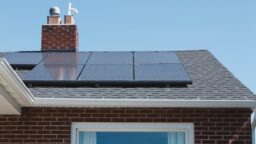Neighbor see, neighbor do. People are more likely to believe in human-caused climate change if they see that the people living next to them do, a new study finds.
“People are learning from their neighbors,” said Andrea La Nauze, a co-author of the study and assistant professor in the University of Pittsburgh’s Department of Economics. “Social norms are very important in people understanding and responding to environmental problems.”
To conduct the study, La Nauze and her Pitt-based research team analyzed five years worth of survey data on Australian communities. They found that for every 1,000 solar panels installed in a neighborhood, the number of people living there that believe humans are causing climate change rose by 7 percent.
“They see their neighbors install solar panels, so they get interested and read more on them and climate change to update their beliefs. Maybe they receive government funding to install panels, or maybe they just believe their neighbors more than scientists. There’s all kinds of possibilities as to why,” Graham Beattie, an assistant professor of economics at Loyola Marymount University who worked on the study as a postdoctoral researcher at Pitt until 2018, said in a news release.
Solar panels are very common in Australia, which made the nation a perfect candidate for this study. Conjecturally speaking, though, there’s no reason that the relationship wouldn’t also exist in the United States or other nations, Beattie explained.
Currently, a record share (46 percent) of Australians believe climate change is “entirely or mainly” caused by humans — up from 32 percent in 2012. An additional 33 percent believe climate change is “partly caused by human activity and partly caused by natural processes,” while 11 percent said it’s “entirely or mainly” caused by natural process. Only 4 percent believe “there’s no such thing as climate change.”
For evidence, they don’t have to look far. Wildfires, believed to be induced by climate change, continue to rage throughout Australia. To this point, they’ve reportedly killed more than 1 billion animals and torched more than 15 million acres.
To prevent further climate-induced damage, serious action must be taken. And public opinion plays a significant role in the likelihood of action taking place.
“Any new laws or advancements in technologies and movements to curb climate change require substantial political and public support. Public perception is crucially important since the public is far more skeptical about climate change than the scientific community,” La Nauze said in the release.
In the United States, for example, 59 percent believe that global climate change is a “major threat,” while 41 percent say it’s a “minor threat” or no threat at all, according to a 2019 Pew Research study.
However, separate from their larger finding, the researchers also determined that for every 1,000 solar panels installed, neighbors’ concerns regarding the effects of climate change fell by nearly 6 percent.
“They believe something large enough is being done to tackle this problem,” La Nauze explained in the news release. “We’re not able to say what the mechanism behind that is, but it is something we’re trying to understand more.”
So, although one may assume it would be a good idea for governments to subsidize solar panels, which would encourage more people to buy them and presumably create more climate science believers, “it’s a little more complicated than that,” La Nauze warned.
“We have to be careful that the message that is sent by these very visible actions is clear,” she said. “For example, 1,000 people putting solar panels on their roof in Australia is really not sufficient to mitigate climate risk. And so, there needs to be an understanding that although it may change some people’s beliefs, it may not do so in a perfectly rational way.”



